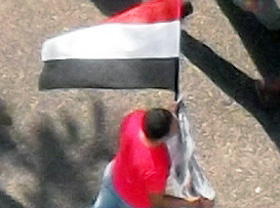[photo: Patti Smith & Winston Rodney, cred Ted Bafaloukos]
Trini in Egypt: A new beginning dawns?

By Natalie Williams
The New Year in Egypt began with a bang. Literally.
Shortly before the Cairo courts opened to allow voting on a referendum for a newly redrafted Constitution, a bomb exploded, underscoring the deep and continued polarisation of this society.
The attack also sent the clearest signal yet that 2014 will continue to be a year of turmoil, as well as a time of hope for the Egyptian people.
Six months after my family and I relocated to Africa’s oldest city, I continue to see Egypt as a fascinating, remarkably complex country that I am indeed content to call home, for now.
Take any random issue and without trying too hard, one can always see at least six different perspectives to a problem – and to the solution to the problem. That’s just the way Egypt ticks.
Terrorist label
As 2014 began, the Islamist Muslim Brotherhood organisation, which lost its grip on democratic governance in successive revolutions, was labelled officially as a terrorist organisation by the interim government.
This did not go down well at all with MB supporters.
At the same time, Egyptians loyal to the group have continued their protests and demonstrations against the ousting of their President, Mohammed Morsi, by the military, in what many still described as a popular coup last year.
The numbers converging on streets and in squares are smaller, but they are still feisty.
The violence continued over Christmas and into the New Year at local universities and nearby communities, not too far from where I live in Cairo.
And, sadly, people continue to die for their cause here in Egypt.
A Cairo Christmas
Over our first Christmas in Egypt, the country remained in turmoil, constant political upheaval and plagued by repeated bouts of civil unrest.
In one incident, three people were killed when protesters set the administration building of a local university on fire.
According to the BBC, more than 1,000 people have died in these violent uprisings and street protests. Six months after my relocation, there is never a dull moment in the capital.
Life on the ground is troublesome, with restricted movement. Three years on from that first revolution that ousted Hosni Mubarak, all my family travel plans still need prior security approvals.
No one here takes a supermarket run for granted. And believe it or not, some days, meeting up with a friend or colleague for a coffee constitutes taking an unnecessary risk.
This is one part of the world where there is no guesswork involved in knowing what people would like the New Year to bring them. Egyptians and foreigners alike want peace and goodwill for all mankind.
Whether Muslims or Christians, diplomats or just ordinary Egyptians, they want stability, prosperity and a better standard of living.
And so 2014 also began with very high hopes, amid tight security and fears of even more violence, when Egyptians took to the streets again.
This time, they were voting over two days in a referendum on a new, re-drafted constitution, which could lead to fresh elections and some democratic stability, as defined by the West.
All across Cairo, Alexandria and the main districts, hundreds of banners and posters were displayed, urging people to come out and vote.
Not a lamp-post was spared. Behind every poster was the understanding that the military leaders expected high voter turnout, urging Egyptians to press for a new, fresh political and social landscape.
My dearest Egyptian friend, Riffat, told me his simple wish: “I really hope to see the Egypt I knew when I was a young man, people loving, accepting each other and know how we can all live together.”
But my home help, Geshan, didn’t bother to vote in the referendum. She says she didn’t think anything would change for her as a woman in Egypt.
It hurts to hear this, but her eyes tell me everything.
Life is truly hard for ordinary Egyptians and all these revolutions later, people are tired.
A need for something better
However, Egyptians on both sides of the divide still have to fight for what they want, continuing this quest for a better political system, a better way of life and a better country that began in 2011, when they overthrew President Hosni Mubarak.
It is clear that a “yes” vote in the constitutional referendum will shape Egypt’s future, for locals and foreigners alike.
Those with options might choose to leave, while those who have thus far sat on the fence could choose to jump into the fray.
On the ground, government and some private sector workers want their salaries paid early, fearing that the expected national troubles will affect the banks.
So what chance is there for the hope that Egyptians are holding in their hearts at the moment?
For me, as I write up my stay for Caribbean Intelligence©, the most significant development is the new constitution’s promise of unprecedented gender equality and rights for women being enshrined in the document (drafted by men, of course).
Since the so-called Arab Spring of 2011, the roles and rights of women in Africa’s oldest city have been under the spotlight. This is the country’s first constitution ever to recognise the rights of Egyptian women, who, of course, turned out in force to vote.
Meanwhile, life on the ground in the first few weeks of 2014 means increased helicopter patrols, armed police and military men still out on the streets in great numbers.
Yet this daunting atmosphere is improved no end by the daily smiles of ordinary Egyptians, as well as their regular utterances of “Inshallah”.
Journalist and children's writer Natalie Williams has been writing for Caribbean Intelligence© about life on the move in Europe and Africa. For more from Caribbean people abroad, check out these pages.
In a year of global challenges and fall-out, we at Caribbean Intelligence© have focused on the aspirational side of Caribbean life.


